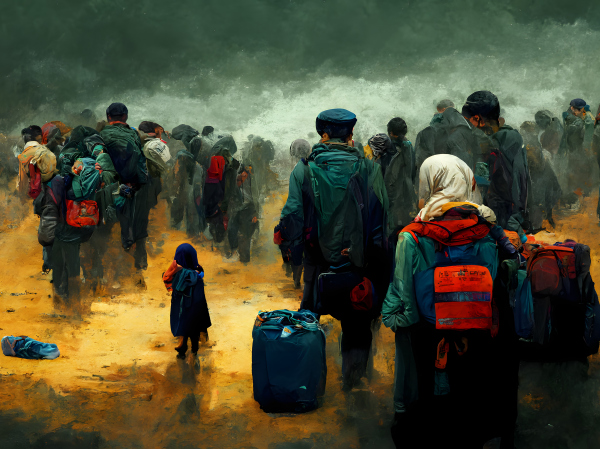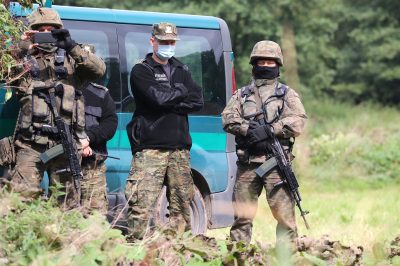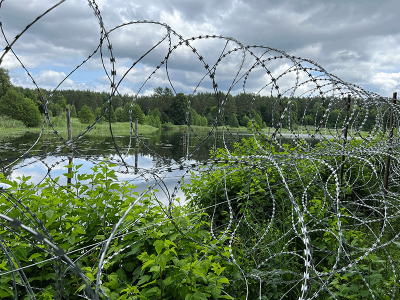
The European Court of Human Rights has notified the Polish government of a further 14 cases of possible human rights violations at the Polish-Belarusian border. HFHR lawyers are supporting the applicants (foreign nationals) in the proceedings before the Court.
All of the communicated cases concern foreigners complaining about a violation of their rights in connection with their return from Poland to Belarus. The applicants argue that even an irregular border crossing cannot deprive anyone of their fundamental rights, such as the right to life, the right to freedom from torture and inhuman treatment or the right to a fair trial. In the recently communicated cases, the applicants complain about the improper behaviour of the Border Guard bodies, who, in their opinion, did not try to fully clarify the circumstances of the case and determine whether the foreigners had declared their intention to apply for international protection and sent the applicants back to Belarus in an inhumane manner and without taking into account their state of health.
Some of the applicants travelled alone, others with families and children. The communicated cases were initiated in the context of the ECtHR issuing an interim measures ordering the Polish authorities not to return foreigners to Belarus due to a high risk of violation of their rights. It was only thanks to the protection granted by the Court that the applicants, who had previously been returned (often repeatedly) to Belarus, were able to apply for international protection on Polish territory. Most of them were placed in guarded centres for foreigners for the duration of the proceedings. The ECtHR applications were filed by foreigners with the support of HFHR lawyers in 2021 and 2022.
The applicants who filed the communicated cases accuse Poland of violating their right to life and freedom from torture and inhuman treatment (Articles 2 and 3 of the European Convention on Human Rights) and refer to the suffering they experienced during repeated push-backs, which often resulted in a threat to their lives. On both the Polish and Belarusian sides of the border, the applicants remained in the forest without access to warm shelter, food and drinking water. Although some applicants reported serious health problems, they were denied access to medical assistance. In some cases, this led to long-term health problems and the need for hospitalisation. In addition, the foreigners were exposed to violence from the Belarusian authorities and possible deportation to their countries of origin, where they may face persecution.
The applicants claim that the Polish authorities never thoroughly examined the individual situation of each of the persons expelled to Belarus, ignoring the serious human rights violations committed by the Belarusian authorities against the migrants. According to the applicants, these activities fulfil the characteristics of collective expulsions, which are prohibited under Article 4 of Protocol No. 4 to the European Convention on Human Rights. The applicants also had difficulties in asserting their rights because they were not provided with an interpreter or a lawyer during the proceedings. They were returned to Belarus either on the basis of a regulation of the Ministry of the Interior and Administration, which did not provide for an obligation to conduct administrative proceedings against the returned person, or on the basis of provisions that allowed for the application of a simplified return procedure. As these activities took place in the zone where first a state of emergency and then an entry ban was imposed, the applicants were unable to seek assistance from lawyers or non-governmental organisations.
The applicants who submitted the communicated cases also emphasised the impossibility of applying for international protection at the Polish-Belarusian border crossings. The applicants were under the strict supervision and control of Belarusian officials, who prevented them from entering the official border crossings with Poland. The lack of access to legal entry routes also resulted from the fact that Poland has not provided effective access to asylum procedures at its external borders for years, which has been confirmed in a number of ECtHR judgments, including in the cases of M.K. and Others v. Poland (2020) and D.A. and Others v. Poland (2021). According to the HFHR, these judgments have not yet been properly implemented. In addition, persons who have declared their intention to apply for international protection have not been included in the list of persons authorised to enter Poland during the COVID-19 pandemic in accordance with the provisions of the Regulation of the Ministry of the Interior and Administration. Therefore, access to the asylum procedure at Poland's external borders has been very difficult since the outbreak of the pandemic, which was also noted by the Ombudsman.
Each time the applicants were sent back to Belarus, they were deprived of their liberty by being forced to stay in military lorries or Border Guard service vehicles to be transported to Belarus, and often also at Border Guard posts in the border area. These detentions were carried out without any legal basis and without any guarantees attached to the detention. The applicants did not have access to a lawyer or an interpreter. They also did not have the opportunity to inform their relatives of their detention. They were also not granted access to a doctor, even though they reported health problems.
In some cases, the applicants also accused Poland of violating their rights in connection with their detention in a guarded centre for foreigners. The conditions in these centres at the time of the humanitarian crisis on the Polish-Belarusian border were assessed by the National Mechanism for the Prevention of Torture as not meeting basic standards due to overcrowding, lack of staff, prison infrastructure or lack of adequate medical and psychological care. Some of the applicants were held for many months in the facility in Wędrzyn, which operated on an active military training ground in 2021-2022 and was repeatedly criticised by the Ombudsman.
HFHR's lawyers will represent the applicants in the next stages of the proceedings before the Strasbourg Court.
Cases communicated by the ECtHR from April to June 2023:
- Joined cases: A.A. and Others v. Poland (no. 48018/21), B.H. v. Poland (no. 57554/21) and H.K. and H.U. v. Poland (no. 58103/21);
- T.Z. and R.Z. v. Poland (no. 61103/21);
- Joined cases: I.A. and Others v. Poland (no. 53181/21), A.H.A. and N.A.A.H. v. Poland (no. 53566/21), Z.K. and Others v. Poland (no. 16746/22) and S.H. and Others v. Poland (no. 16748/22);
- Joined cases: M.A. v. Poland (no. 51241/22), G.K. v. Poland (no. 51248/22), A.H.A. v. Poland (no. 51284/22) and N.M.A. v. Poland (no. 51285/22);
- A.S. v. Poland (no. 15318/22);
- H.K. and Others v. Poland (application no. 12752/22).


